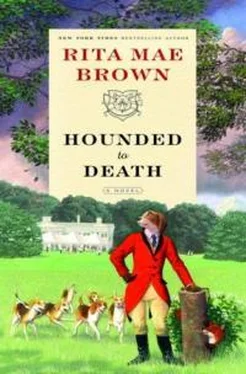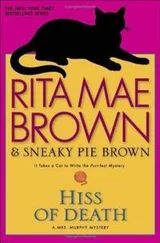“Occasionally.”
“What is the research?”
Mitch, hand still on the door latch, thought how to put this in simple English. “My work involves the amount of fat surrounding major organs. One of the causes of death at the end of certain kinds of cancers, and a contributing factor to death in famine-cursed countries, is the lack of fat around organs. It’s fascinating, really. On the one hand, we have an obesity epidemic, and on the other, people can’t keep warm because they don’t have sufficient body fat.”
“So you starved them, killed them, and then operated to study the organs.”
Stunned at how quick Ben’s mind was, Mitch swallowed. “Yes.”
“Again, thank you.” Ben left.
As Ben drove out, he passed a tidy two-story dependency, taupe clapboard with maroon shutters. Stepping out into the cooling evening air was Barry Baker, all spiffed up. Barry waved.
Ben stopped the car. “Going to be a long weekend here for you?”
“Love it here. Just love it. Quite a hunt today.”
“Yes, it was. No one will ever forget it.”
“You and I have both seen the worst of human behavior,” said Barry. “I was in Korea, and I’ll tell you, Ben, individual crime is worse. War isn’t personal, if you know what I mean.”
“I do. We found out who that skull used to be. It was a lab tech Mitch fired. Alcoholic.”
“That’s a sad end. Ever see Hogarth’s drawing Gin Lane ?”
“Have.”
“Accurate then. Accurate now.”
“Sure is. Say, you look ready for action.”
“You never know. It’s the vest, isn’t it?”
Judge Baker wore a handsome tweed herringbone jacket, a red vest, and a white shirt with a forest green tie embroidered with foxes. Pinwale tan cords and expensive handmade calf shoes completed his attire. Of course, he wore his platinum watch.
“I’d be chicken to wear a red vest. I’ve got to hand it to you.”
“Take a lesson from an old man: Women notice clothes. In fact, women notice everything; they can recall a pinstripe shirt you wore three years ago at a cocktail party. Money spent on good clothing is never wasted. Of course”—he smiled rakishly—“time spent with women is never wasted either.”
“I’ll remember that.” Ben waved and drove off.
Two hours later, Judge Baker and his red vest were relaxing in the perfectly proportioned living room at Roughneck Farm.
Sister had had the entire interior of the house repainted two years ago. The living room walls had been freshened with a creamy eggshell; the trim was sparkling white. Now she was glad she’d endured the upheaval because the room looked spectacular.
Val, Tootie, Gray, Barry, and Sister glowed as people tend to do after a wonderful meal. The men sipped at brandy; the girls drank iced tea, as did Sister.
Val, as usual, proved entertaining. “Felicity waddles!”
“She’s due next week,” Sister informed the men, although Gray already knew. “In my last weeks of pregnancy I felt a strange kinship with hippos.”
“You. Never?” Judge Baker roared with laughter. “I remember when you were pregnant, and you carried it off with your usual aplomb.”
“That’s base flattery.” Sister smiled.
Val devilishly taunted the men. “Didn’t you feel guilty when your wives were pregnant?”
Gray, holding his brandy snifter, sighed. “I did. I confess I did. She had a hard time of it. Sick from the beginning.”
“We didn’t have that problem.” Barry said we, which spoke volumes about his relationship with his deceased wife. “I wondered how I was going to pay for it all. Then I thought about college and, if it was a girl, the wedding. I allowed myself an overactive imagination. Well, the first one was a girl and the second, too. We managed.”
“I still think Felicity is throwing her life away.” Val lapsed into her old complaint, one she’d been harping on since Felicity had first revealed her pregnancy.
“Val, she’s happy.” Tootie had been disagreeing with Val since then, too.
“Happy? How can she be happy when she’s a blimp? She can’t bend over. If she sits down, she can’t get up without help. How can she be happy?”
“She is.” Tootie turned her attention to the others. “She really is. She wants to get it over with, but she’s so excited.”
“It is exciting.” Sister smiled. “Val, I don’t know if you will ever become pregnant, but if you do and if it’s what you desire, you truly will forget the pain and remember the joy. And what is more exciting than giving life? I get giddy every time I whelp puppies.”
The corners of Gray’s mouth turned up. “You like whelping pups better than giving birth yourself. I’d bet on that.”
“I would, too. Janie loves her hounds better than people.” Barry lifted his glass to her.
“Oh,” Sister mused, “half and half. Or how about even-steven. I like them both, but there is something to be said for not having to produce the child yourself.”
“Men have been saying that for years.” Barry laughed again. “Say, to change the subject—or to expand on it—is a puppy’s life as valuable as a human’s?”
“Is this a trick question?” Val’s response was swift.
“You’re going into politics, aren’t you?” Barry began to feel his vest was too warm.
“Maybe.” Val proved his point right there.
Tootie looked to Sister, since she felt the master should answer first.
Sister, sensitive to Tootie as to few others, said, “Go on. I’ll go last, how’s that?”
Tootie stated her belief concisely. “I think all life is sacred.”
“Sacred, yes. But are those lives equal ?” Barry pressed.
“Yes.” Tootie didn’t hesitate.
Gray, relaxed, his sleeves rolled up, replied. “Much as I love the hounds, the horses, and, of course, Golly,”—he had to say that when she jumped on his lap—“I believe human life is more valuable.”
“Even someone like Mo Schneider?” Barry prodded.
“I suppose if you take it on a case-by-case basis, some animal lives are more worthy than some human lives, but on the whole I value human life more,” Gray responded.
“Me, too. That doesn’t mean there aren’t people I wouldn’t like to kill,” Val chimed in.
“Really?” Barry’s eyebrows shot upward.
“Sure. Haven’t you ever been mad enough to kill?” Val boldly questioned him.
“Many times.”
“Sister, haven’t you been mad enough to kill?” Val turned to her master.
“I have, and it was usually my late husband who provoked that combustible emotion.”
Gray and Barry laughed.
“Back to life.” Val directed this to Sister. “You didn’t tell us what you think.”
“I think my hounds’ lives are as important as human lives. My horses. Raleigh. Rooster. Golly. I can’t distinguish because my love for them is so great.” She pursed her lips to say something; then her eyes lit up. “Funny, must be a year ago now, Hope Rogers and I were talking about this very thing. I know you-all are bored with my not accepting that Hope killed herself, but this discussion just reminded me that Hope must have stumbled upon some kind of cruelty. She wouldn’t say what it was, exactly. But we did talk about the slaughterhouses closing and people who were letting unwanted horses starve to death. She was on overload from overwork. She told me horror stories about people loading unwanted horses onto rickety vans and crossing the line into Mexico to go to those filthy slaughterhouses. The Thoroughbred Retirement Foundation was Hope’s true passion. I think she lifted up a very big rock and the snake underneath bit her. If you think about it—Mo, Grant, even that homeless man, Jake—all of them were considered cruel to animals in some fashion, except Hope. Maybe that’s what these deaths have in common.”
Читать дальше












